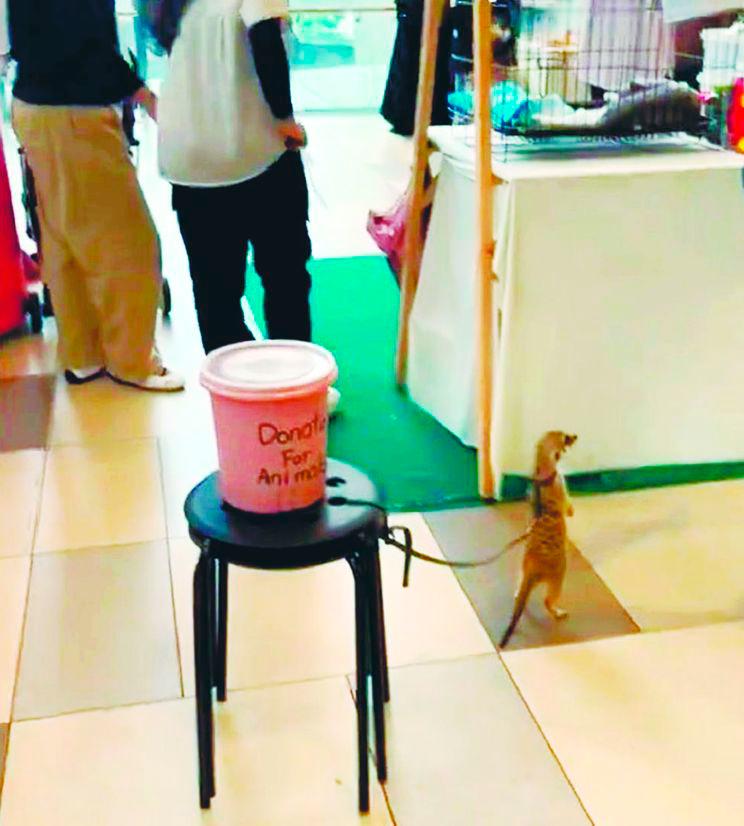PETALING JAYA: Leashed to a chair and pacing beside a donation box, a meerkat at a Kuala Lumpur mall has become the face of growing public outrage over animal exploitation in Malaysia’s booming pop-up zoo industry.
The TikTok video that exposed the scene lasted less than a minute but the backlash was swift. Viewers flooded the comments, calling the display “cruel”, “heartbreaking” and “a disgrace”.
In the background, shoppers walked by, seemingly unfazed by the small, visibly distressed animal tethered in place for public amusement.
Animal welfare groups say what the public saw is just the surface of a much darker problem.
“These animals are not suited for confined spaces or constant human interaction,” said Persatuan Haiwan Terbiar Malaysia president Kalaivanan Ravichandran, condemning the use of exotic species in temporary public exhibits.
“Using them for entertainment disrupts their natural behaviour, and causes physical and psychological stress.”
He said the conditions in many of these pop-up exhibits amount to prolonged suffering for the animals.
Often operating in legal grey areas, these setups use exotic species as photo props with little oversight or enforcement.
“Most of these setups prioritise profit over proper animal care. We often see signs of stress in the animals, inadequate enclosures and a lack of veterinary oversight,” he said, adding that their use is often unethical
and lacks genuine educational or conservation value.
He questioned whether operators comply with the Animal Welfare Act 2015, which outlines minimum standards for housing, handling and exhibiting animals.
Under the law, organisers must obtain permits from the Veterinary Services Department and Wildlife and National Parks Department, with regular inspections.
“All parties involved, such as event organisers, zoo operators and venue providers, must be held accountable. Organisers must uphold ethical standards, operators must ensure the animals’ welfare and venues must enforce compliance with the law.”
Kalaivanan also called for stronger enforcement by authorities.
“Laws are only effective when properly enforced. We urge both departments to adopt a firmer stance.”
He appealed to the public to report suspected abuse and stop supporting entertainment that exploits animals.
“Animals deserve to be treated with dignity. If you witness mistreatment, do not stay silent. Speak up and report it. Together, we can create a society that protects and respects all living beings.”
Veterinarian Dr Salehatul Khuzaimah Mohamad Ali said exotic animals, such as meerkats, are especially vulnerable to stress in captive environments.
“Meerkats are highly sensitive and could develop chronic stress when subjected to unfamiliar environments and constant human interaction. This stress weakens their immune system, making them more susceptible to illness.”
She added that such animals may exhibit stereotypic behaviours (repetitive, unnatural actions, such as pacing or head bobbing), which are signs of mental distress.
Without appropriate shelter or hiding places, they could become aggressive or withdrawn. Long-term confinement could even erase natural behaviours, such as burrowing, climbing or basking.
Salehatul warned that cramped conditions and improper flooring could cause musculoskeletal issues while poor diets and irregular feeding may lead to obesity or malnutrition.
“Temporary setups often fail to maintain species-appropriate temperature and humidity. This increases the risk of dehydration, respiratory distress and even organ failure.”
Inadequate hygiene and close public contact also raise the risk of parasitic infections, skin diseases and the transmission of zoonotic illnesses.
“A high standard of veterinary care is essential when displaying exotic animals in public settings.”
She added that this includes health screenings, regular checkups, behavioural monitoring and proper documentation.
“A veterinarian must assess whether an animal is fit for public display. No animal should be forced to interact or perform under stress or poor health conditions.”
She noted that event operators are required to have a qualified veterinarian either on-site or on-call throughout the exhibition period.
She urged the public to reconsider the ethics of these exhibits.
“We need to move away from wildlife encounters that prioritise entertainment over welfare. It is time to shift public perception and stop supporting such practices.”









